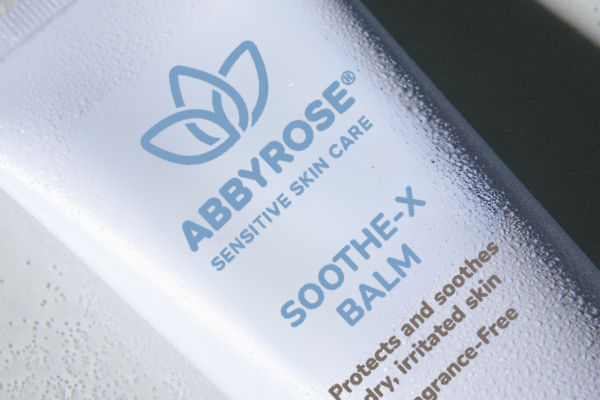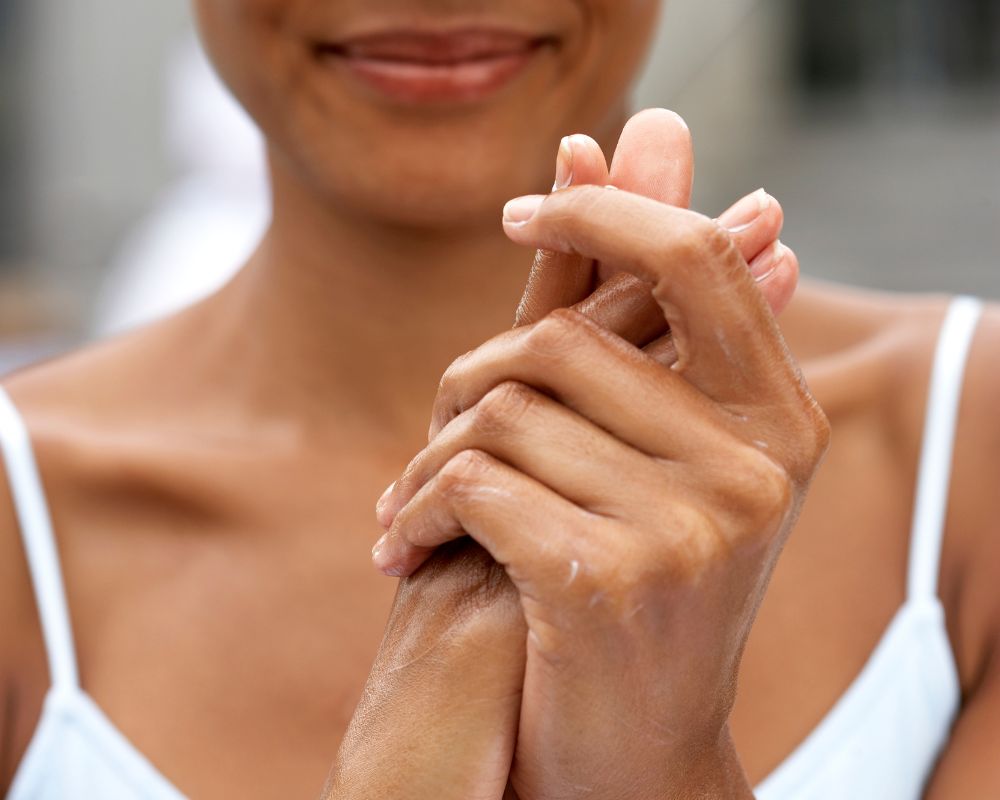How to Know If You Have Sensitive Skin
Sensitive skin is on the rise and now affects more than half the population. It can vary from person to person, but if you notice several of these signs and symptoms consistently, that’s a good indication you may have sensitive skin. These signs include:
- Redness: If your skin easily becomes red, flushed or you have visible capillaries on your face, it could be a sign of sensitivity. This redness may occur in response to certain skin care products, environmental factors, or even mild friction.
- Irritation: Your skin may react to various products, such as skin care or cosmetic products, with itching, burning or stinging. Certain fabrics, particularly rough or synthetic materials, may also cause discomfort, itchiness, or irritation.
- Dryness: Your skin tends to be dry, flaky and dehydrated, often feeling tight and uncomfortable especially after cleansing or exposure to harsh weather conditions.
- Allergic reactions: You may experience allergic reactions or hypersensitivity to certain ingredients like fragrances, dyes, preservatives, or even natural botanical extracts, resulting in rashes, hives, or swelling.
- Breakouts: Your skin may be prone to acne or other types of breakouts, often triggered by the use of harsh products, stress, or hormonal imbalances.
- Fragrance sensitivity: Fragrances, particularly in skin care, cosmetic products and laundry detergent, may cause your skin to react negatively. This includes natural fragrances, such as essential oils.
- Sun sensitivity: Your skin may be more prone to sunburn or experience heightened reactions to sun exposure, leading to redness, irritation, or rashes.
- Reactions to weather changes: Your skin may react to changes in weather conditions, such as extreme cold or heat, with increased sensitivity and discomfort.
What Causes Sensitive Skin?
Sensitive skin can be caused by a combination of genetic, environmental, and lifestyle factors. Understanding your specific triggers and factors that contribute to your skin sensitivity can help you manage and care for your skin effectively. Here are some common factors that can contribute to sensitive skin:- Genetic predisposition: Some individuals are genetically more prone to having sensitive skin. If other members of your family have sensitive skin or a history of skin conditions like eczema or rosacea, you may have an increased likelihood of having sensitive skin as well.
- Impaired skin barrier: When the skin barrier is compromised or weakened, it can result in increased sensitivity. Factors such as excessive cleansing, harsh skin care products, environmental irritants, and certain skin conditions can impair the skin barrier function.
- Allergies and irritants: Allergic reactions to certain substances or contact with irritants can lead to sensitive skin. Common irritants include harsh chemicals, fragrances, dyes, preservatives in skin care or cosmetic products. Environmental factors like pollution, extreme weather conditions, and allergens can also trigger skin sensitivity.
- Skin conditions: Certain skin conditions, such as eczema, rosacea, and psoriasis, are often associated with sensitive skin. These conditions can cause inflammation, redness, and heightened sensitivity to various triggers.
- Hormonal changes: Hormonal fluctuations, such as those that occur during puberty, pregnancy, or menopause, can affect the skin's sensitivity. Many people notice changes in their skin's reactivity during these periods.
- Overexposure to sun: Prolonged or excessive sun exposure can damage the skin and compromise its protective barrier, leading to increased sensitivity. Sunburns can also contribute to temporary sensitivity.
-
Stress and lifestyle factors: Emotional stress, lack of sleep, and unhealthy lifestyle habits like poor diet, smoking or excessive alcohol consumption can impact skin health and contribute to sensitivity.
How to Help Relieve Sensitive Skin?
- Choose gentle skin care products: Opt for mild, fragrance-free, and hypoallergenic products specifically formulated for sensitive skin. Look for labels that indicate the product is suitable for sensitive or reactive skin. Avoid products that contain potential irritants such as fragrances, dyes, and harsh chemicals.
- Keep your skin care routine simple: Limit the number of products you use and simplify your skin care routine. This can help reduce the likelihood of exposing your skin to potential irritants. Cleanse your skin gently, avoiding harsh scrubbing or exfoliation.
- Patch test new products: Before applying a new skin care product to your face or body, perform a patch test. Apply a small amount of the product on a small area of skin (like your inner forearm) and observe for any adverse reactions over 24 to 48 hours. If there is no negative reaction, it is generally safe to use the product.
- Moisturize regularly: Keeping your skin hydrated is crucial for maintaining its barrier function and reducing sensitivity. Choose an organic, fragrance-free, preservative-free moisturizer, such as Abby Rose Soothe-X Balm, that is suitable for sensitive skin and apply it regularly, especially after cleansing or bathing to lock in the moisture. Look for ingredients like sunflower oil, shea butter or beeswax, which help improve the skin's moisture retention.
- Protect your skin from the sun: Sun exposure can exacerbate skin sensitivity, so it's important to protect your skin from harmful UV rays. Wear a mineral-based sunscreen with a high SPF, seek shade during peak sun hours, and cover your skin with protective clothing, hats, and sunglasses. Avoid sunscreen that contains oxybenzone, a known skin irritant.
- Avoid hot water and harsh conditions: Hot water and harsh cleansers can strip away the skin's natural oils and further irritate sensitive skin. Limit your shower time to 10 minutes, opt for lukewarm water, and choose a gentle, conditioning cleanser like Abby Rose Soothe-X Soap. Additionally, try to minimize exposure to harsh weather conditions like extreme cold or wind, as they can worsen skin irritation.
- Manage stress: Emotional and physical stress can contribute to skin sensitivity. Practice stress management techniques such as meditation, deep breathing exercises, or engaging in activities that help you relax. Getting enough sleep and maintaining a healthy lifestyle can also promote overall skin health.
FAQs
Are skin care products labeled “hypoallergenic” better for sensitive skin?
While some hypoallergenic products may indeed be formulated with ingredients that are less likely to cause allergic reactions, there is no guarantee that they will work well for everyone with sensitive skin. Skin sensitivities and allergies can differ from person to person, so what works for one individual may not work for another. It's crucial to review the ingredient list of any product. Look for common irritants or allergens that your skin may be sensitive to, such as fragrances, essential oils, preservatives, dyes, or certain botanical extracts.
Can eating healthy help sensitive skin?
Yes, maintaining a healthy diet can positively impact your sensitive skin. While diet alone may not be a cure-all for sensitive skin, it can support overall skin health and potentially reduce inflammation and irritation. For some individuals, certain dietary triggers, such as spicy foods, dairy, gluten, high sugar, alcohol, caffeine, or processed foods, can worsen skin sensitivity or trigger flare-ups. Conversely, certain foods rich in antioxidants, such as berries, leafy greens, and colorful vegetables, can help combat inflammation that may contribute to skin sensitivity. Foods rich in omega-3 fatty acids, such as fatty fish (salmon, mackerel), walnuts, flaxseeds, and chia seeds, can help reduce inflammation in the body, potentially benefiting sensitive skin.
While a healthy diet can support skin health, it's important to note that individual responses to food can vary. If you suspect that certain foods may be affecting your skin's sensitivity, consider keeping a food diary to track any potential correlations between your diet and skin reactions.
Should I be concerned about sensitive skin?
Having sensitive skin itself is not a cause for major concern. However, it does require careful attention, tailored skin care and a healthy lifestyle to manage and prevent its discomfort. Taking steps to address these symptoms and adopt a skin care routine that is gentle, soothing, and suitable for your specific needs, can help improve your overall skin health and quality of life. It's always advisable to consult with a dermatologist for personalized advice and recommendations.
 Shop Abby Rose
Shop Abby Rose




